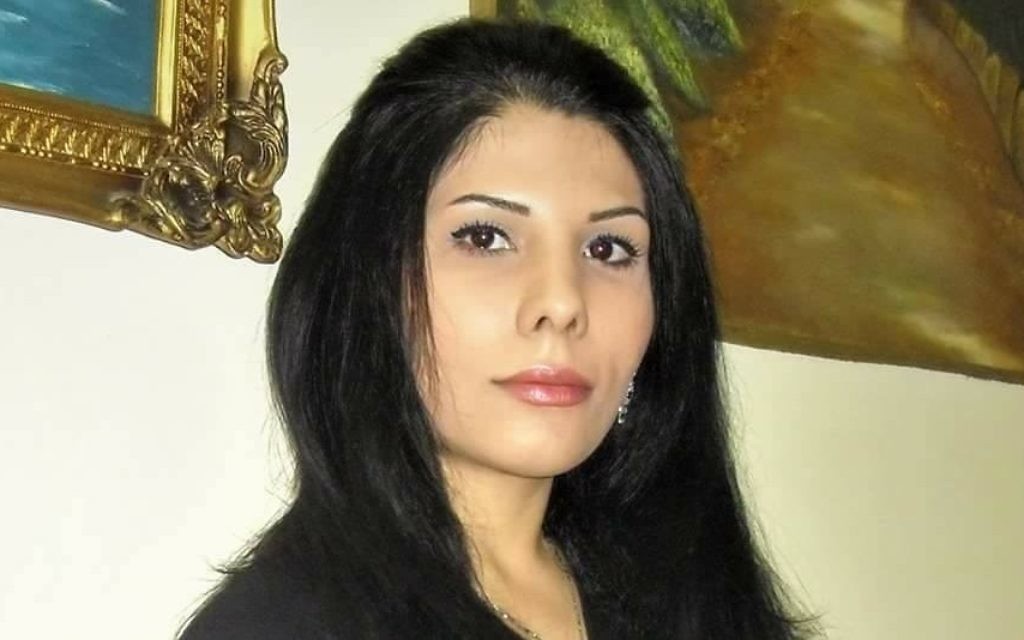Jewish State Gives Iranian Journalist Refuge
Iranian-born journalist finds safety in Israel after leaving native country.

When Iranian-born journalist and Times of Israel blogger Neda Amin sought refuge this summer while fearing her life was in danger in Turkey, she found support from Times of Israel Editor David Horovitz, who contacted Israeli officials and helped Amin move to Israel.
While living in Iran, Amin reported on various events and wrote a series of books that caught the attention of the Islamic regime in Tehran. She was accused of composing literature that deviated from societal norms and was sentenced to two years of probation by Iran’s revolutionary court.
Despite her trial, Amin composed another publication that led to her decision to flee.
Get The AJT Newsletter by email and never miss our top stories Free Sign Up
“I didn’t want to leave Iran. I loved my country, but I feared being thrown in prison,” she said.
Making her way to Turkey in 2014, Amin continued her career as a reporter for The Times of Israel (an online partner of the AJT) until Turkish authorities began subjecting her to frequent interrogations. They accused her of being an Israeli spy and this year threatened her with deportation to Iran if she refused to work with them.
Amin was told by her lawyer and the United Nations that the only thing they could do was to send her case to Geneva, where she could lose, with the result that she would be sent back to Iran to be thrown in prison.
“I cried constantly and felt that my life was becoming a nightmare,” said Amin, who faced execution or the amputation of her right hand and left foot as well as torture and rape in Iran. “I was ready to commit suicide rather than fall into the Revolutionary Guard’s hands.”
In the midst of hopelessness, however, Horovitz contacted Amin to learn more about her situation. “I didn’t think he would do anything to help me but decided to share my story.”
Amin said Horovitz told her to travel to Istanbul, where she would receive an Israeli visa.
In Istanbul, Amin encountered further complications when Turkish authorities refused to let her leave.
“I was shocked and confused and wanted to know why they were restraining me if they sought to deport me earlier,” said Amin, who had three days of frustration in Istanbul until Horovitz contacted the Israeli Consulate.
“They wouldn’t tell me anything and would not provide any information. However, after speaking with Horovitz, I was told to go home and not to worry, as they would take care of everything,” she said. “I don’t know what they said, but I received a call the following day to come sign some forms so I could finally leave.”
Alongside her German shepherd, Chica, Amin boarded the plane that would fly her to Tel Aviv in early August.
“I was fearful until the last moments before the flight took off as there were so many Turks on the flight and I thought I would be arrested,” said Amin, who was greeted by Horovitz in Israel. “I started crying when I reached immigration and couldn’t stop for five days out of sheer happiness.
“I am so grateful to Mr. Horovitz and very appreciative of the help Israel provided.”
Although Amin has lived in Israel for two months, she continues to wake up in fear in the middle of the night and feels unsafe.
“They really put me through a lot, and I couldn’t tell if it was the Iranian or Turkish government who was behind the interrogations,” she said.
While Amin lived in Turkey, her apartment was ransacked five times, including twice while she was home with Chica, who drove off the intruders.
“I don’t know what I would have done had it not been for her,” Amin said.
Since arriving in Israel, Amin has gained some solace while assimilating into Israeli culture.
“I feel like I’m at home, and everything is peaceful. People treat me humanely and are actually very nice,” she said. “When I told people I was from Iran and Turkey, it’s as if they wanted to cut my eyes out, but when I tell Israelis I’m Persian, they immediately exclaim how much they love Iranians.”
Amin is taking Hebrew classes, and, despite limited English, she is adjusting to her new home. She continues to write, but she has limited opportunities to do so in her native Farsi. “I am not used to working outside the confines of Farsi, but it’s not a big problem as I am still able to communicate in English.”
With Iranian Revolutionary Court orders hanging over her, Amin blogs under the Iranian regime’s watchful eyes. “I hope to continue reporting on current events and tell people about Israel so their perception can change, especially in Iran,” she said. She wants to build a relationship between Israel and Iran through her reporting. “It’s my obligation to help expose the truth and let people know what’s taking place. I want to keep individuals informed and reveal their hidden struggles in my own language.”




comments